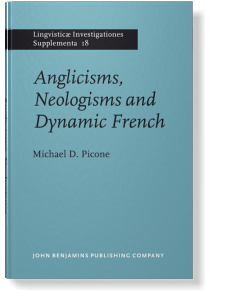Anglicisms, Neologisms and Dynamic French
This comprehensive study of Anglicisms in the context of accelerated neological activity in Contemporary Metropolitan French not only provides detailed documentation and description of a fascinating topic, but opens up new vistas on issues of general linguistic interest: the effects of technology on language, the analyticity-syntheticity controversy, the lexical contribution to language vitality, the study of compound word formation, the interplay between cultural and linguistic affectivity. By investigating the dynamics of borrowing within the larger framework of general neological productivity and by bringing to bear cognitive and pragmatic considerations, a much-needed fresh approach to the entire question of Anglicisms takes shape.
All pertinent phenomena regarding Anglicisms in French a topic which continues to command the attention of language commentators and defenders in France and elsewhere are explored: integral borrowings, semantic calques, structural calques, the generation of pseudo-Anglicisms and hybrids, graphological and phonological phenomena. In each case, the phenomenon is investigated in the proper context of its interaction with other pertinent neological, phonological and sociocultural developments. These include general changes in French compound word formation, modified derivational dynamics, the microsystem of pseudo-Classical morphology, historic phonological instabilities, the pressure for more synthetic types of lexical production in relation to the needs of technology and society.
Rather than adhering rigidly to any single theoretical model, there is an attempt to set up a dialog between differing models in order to arrive at a multidimensional view of the phenomena investigated.
[Lingvisticæ Investigationes Supplementa, 18] 1996. xii, 462 pp.
Publishing status: Available
© John Benjamins Publishing Company
Table of Contents
-
Acknowledgments | p. xi
-
Definitions and Issues
-
Juxtapositional Neology
-
Binomial Constructions | p. 110
-
Neological Diversity
-
Conclusion | p. 366
-
-
Index of Names | p. 385
-
Index of Linguistic Forms | p. 391
“Rich in data, in sensitivity to cultural, sociolinguistic and historical issues [...] and in structure analyses,[...].”
Douglas C. Walker, University of Calgary
“[...] certainly worth the investment for anyone conducting research on language change in modern French.”
Jeff Allen in French Language Studies Vol. 11, 2001
Cited by (28)
Cited by 28 other publications
Koga, Kentaro
2024. Chapter 10. [N1 + N2], [N + A], and [N1 + de + N2]. In Competition in Word-Formation [Linguistik Aktuell/Linguistics Today, 284], ► pp. 297 ff. 
Martin, Elizabeth
Adamczyk, Roman
Lillo, Antonio
Schaefer, Sarah Josefine
Schaefer, Sarah Josefine
Ološtiak, Martin & Soňa Rešovská
Ološtiak, Martin & Soňa Rešovská
Tallarico, Giovanni
KRASAVINA, Valentyna
Planchon, Cecile & Daniel Stockemer
Rodríguez González, Félix
Fujimura, Itsuko
Fujimura, Itsuko
Koga, Kentaro, F. Neveu, B. Harmegnies, L. Hriba & S. Prévost
Olefir, H., I. Deineko & I. V. Deineko
PLANCHON, CÉCILE
Neuwirth, Rostam J.
Vuletić, Lea, Stjepan Špalj, Kristina Peroš, Hrvoje Jakovac, Ana Ostroški Anić & Marin Vodanović
2017. Assessing the influence of the English language on the professional vocabulary of Croatian dental students by analysing their word choice for the translation of medical/dental terms. Terminology. International Journal of Theoretical and Applied Issues in Specialized Communication 23:2 ► pp. 181 ff. 
Izwaini, Sattar
2014. Translation and linguistic recycling in Arabic. Babel. Revue internationale de la traduction / International Journal of Translation 60:4 ► pp. 487 ff. 
Renner, Vincent
WALSH, OLIVIA
SAUGERA, VALÉRIE
CHESLEY, PAULA
Treffers-Daller, Jeanine
DAVIS, BOYD
This list is based on CrossRef data as of 23 october 2024. Please note that it may not be complete. Sources presented here have been supplied by the respective publishers. Any errors therein should be reported to them.
Subjects
Main BIC Subject
CF: Linguistics
Main BISAC Subject
LAN009000: LANGUAGE ARTS & DISCIPLINES / Linguistics / General
